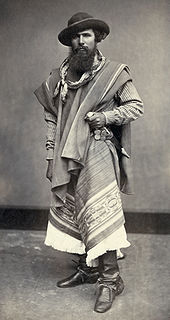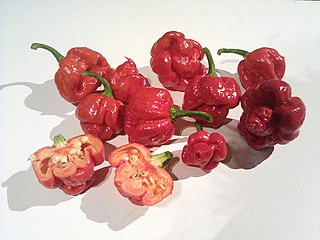| Origin | |
|---|---|
| Word/name | Spanish |
| Meaning | “Trinity” |
| Other names | |
| See also | Trini, Trinity |
Trinidad is a given name of Spanish origin that is often given in reference to the Christian doctrine of the Trinity, or one God in three persons. [1] It is currently among the most popular names for girls in Chile. [2]
The music of Latin America refers to music originating from Latin America, namely the Romance-speaking regions of the Americas. Latin American music also incorporates African music from enslaved African people who were transported from West and Central Africa to the Americas by European settlers, as well as music from the Indigenous peoples of the Americas. Due to its highly syncretic nature, Latin American music encompasses a wide variety of styles, including influential genres such as cumbia, bachata, bossa nova, merengue, rumba, salsa, samba, son, and tango. During the 20th century, many styles were influenced by the music of the United States giving rise to genres such as Latin pop, rock, jazz, hip hop, and reggaeton.

Cypress is a common name for various coniferous trees or shrubs of northern temperate regions that belong to the family Cupressaceae. The word cypress is derived from Old French cipres, which was imported from Latin cypressus, the latinisation of the Greek κυπάρισσος (kyparissos).
Chilean music refers to all kinds of music developed in Chile, or by Chileans in other countries, from the arrival of the Spanish conquistadors to the modern day. It also includes the native pre-Columbian music from what is today Chilean territory.

A gaucho or gaúcho is a skilled horseman, reputed to be brave and unruly. The figure of the gaucho is a folk symbol of Argentina, Uruguay, Rio Grande do Sul in Brazil, and the south of Chilean Patagonia. Gauchos became greatly admired and renowned in legend, folklore, and literature and became an important part of their regional cultural tradition. Beginning late in the 19th century, after the heyday of the gauchos, they were celebrated by South American writers.

Hinduism is a minority religion in South America, which is followed by even less than 1% of the total continent's population. Hinduism is found in several countries, but is strongest in the Indo-Caribbean populations of Guyana and Suriname. There are about 320,000 Hindus in South America, chiefly the descendants of Indian indentured laborers in the Guianas. There are about 185,000 Hindus in Guyana, 120,000 in Suriname, and some others in French Guiana. In Guyana and Suriname, Hindus form the second largest religion and in some regions and districts, Hindus forms the majority. Though in recent times, due to influence of Hindu culture the number of Hindus converts have increased in other countries in South America, including Brazil, Argentina, Venezuela and others.
Fitzwilliam, lit. "Son of William", is derived from the Anglo-Norman prefix Fitz often used in patronymic surnames of Anglo-Norman origin; that is to say originating in the 11th century ; and from William, lit. "Willpower/Desire Protector", which is a popular given name of old Germanic origin, becoming very popular in the English language after the Norman conquest of England in 1066, and remained so throughout the Middle Ages and into the modern era). While more popular as a surname, it does have some popularity as a given name.

Cueca is a family of musical styles and associated dances from Chile, Argentina, and Bolivia. In Chile, the cueca holds the status of national dance, where it was officially declared as such by the Pinochet dictatorship on September 18, 1979.
Lora is a female given name and family name in the Spanish language of French origin.

Chilean Spanish is any of several varieties of Spanish spoken in most of Chile. Chilean Spanish dialects have distinctive pronunciation, grammar, vocabulary, and slang usages that differ from those of standard Spanish. The Royal Spanish Academy recognizes 2,214 words and idioms exclusively or mainly produced in Chilean Spanish, in addition to many still unrecognized slang expressions.

Iván Patricio Eugenio Manns de Folliot was a Chilean singer, composer, author, poet, novelist, essayist, play writer and journalist.

A marraqueta, also known as pan francés and other names, is a bread roll made with wheat flour, salt, water and yeast. This type of roll has a crunchy texture, and is very popular in South America, and also Portugal, Mallorca, Hong Kong and Macau. The oldest references of the name situate its origin in Chile.
Russian Chileans form a minor part of the Russian diaspora and a small group in comparison to the other ethnic groups in Chile. The 2002 Chilean Census reported 638 Russian citizens, although Russia's government estimates that 1,300 Russians live in Chile. There are more than 70,000 Orthodox Christians in Chile, the majority of them of Russian or Greek origin. Also, a significant amount of Russian Jews arrived in Chile during the 20th century.
Eyzaguirre is a surname of Basque origin. Spelling variants include Eizaguirre, attested specially in Spain, or Eizagirre, modern Basque spelling. Other historically attested forms are "Aizaguirre", "Aiçaguer", "Aizagerri".

British–Chile relations are foreign relations between the United Kingdom and Chile. The two countries maintain strong cultural ties as Chilean culture was somewhat anglicised after independence, seeing many mutual investments since. Standard visits, on terms each country applies, allow visitors and short-term study, without need for a travel visa endorsed in a passport.
Los Bajos is a place name of Spanish origin.
Isidora or Isadora is a female given name of Greek origin, derived from Ἰσίδωρος, Isídōros.

The Trinidad Moruga scorpion is a chili pepper native to the village of Moruga, Trinidad and Tobago. It is one of the spiciest chilies in the world. In 2012, New Mexico State University's Chile Pepper Institute identified the Trinidad Moruga scorpion as the hottest chili at that time, with heat of 1.2 million Scoville heat units (SHUs). In 2017 according to Guinness World Records, the hottest pepper was the Carolina Reaper, with 1.6 million SHU.
Persaud is a Hindu surname originating in the Kayastha Ambashtha community, primarily found in Guyana, Suriname, South Asia, Fiji, South Africa, Mauritius, Trinidad and Tobago, and other parts of the Caribbean. It is derived from the Hindi surname प्रसाद which is predominantly transliterated as Prasad in India. Other variant forms include Persad, Persard, Pershard, Prasada, Prashad, Presad, and Presaud.

Buljol is a salad dish of the cuisine of Trinidad and Tobago. It consists of chopped salted cod, tomatoes and chilies. The name is of French origin. 18th-century colonial power Spain launched the cédula de población in 1783, an edict that successfully promoted the settling of French planters in Trinidad who quickly set the population majority. The name is a combination of the French words brulé ('burnt') and gueule ('muzzle'), which was changed into bu'n jaw in Trinidad's 19th century patois and finally morphed into buljol. The name does not relate to the temperature of the dish but to its spiciness, caused by the added hot pepper.